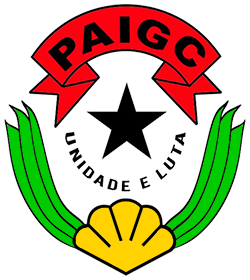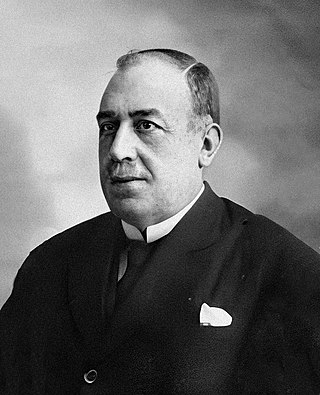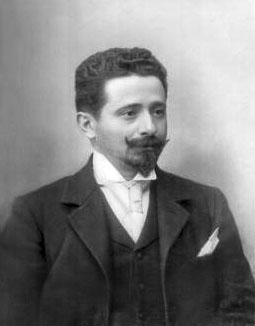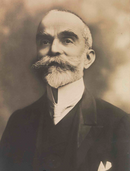
The president of Portugal, officially the president of the Portuguese Republic, is the head of state and highest office of Portugal.

The African Party for the Independence of Guinea and Cape Verde is a political party in Guinea-Bissau. Originally formed to peacefully campaign for independence from Portugal, the party turned to armed conflict in the 1960s and was one of the belligerents in the Guinea-Bissau War of Independence. Towards the end of the war, the party established a socialist one-party state, which remained intact until multi-party democracy was introduced in the early 1990s. Although the party won the first multi-party elections in 1994, it was removed from power in the 1999–2000 elections. However, it returned to office after winning parliamentary elections in 2004 and presidential elections in 2005, since which it has remained the largest party in the National People's Assembly.

Manuel Teixeira Gomes, GCSE was a Portuguese politician and writer who served as the seventh president of Portugal between 5 October 1923 and 11 December 1925.

António José de Almeida, GCTE, GCC, GCA, GCSE, was a Portuguese politician who served as the sixth president of Portugal from 1919 to 1923.

The Brazilian Socialist Party is a political party in Brazil. It was founded in 1947, before being abolished by the military regime in 1965 and re-organised in 1989 after the re-democratisation of Brazil. It elected six Governors in 2010, becoming the second largest party in number of state governments, behind only PSDB. In addition to that, it won 34 seats in the Chamber of Deputies and three seats in the Senate, besides having been a member of the For Brazil to Keep on Changing coalition, which elected Dilma Rousseff as President of Brazil.

Constituent Assembly elections were carried out in Portugal on 25 April 1975, exactly one year after the Carnation Revolution. The election elected all 250 members of the Portuguese Constituent Assembly.

António Óscar de Fragoso Carmona was a Portuguese Army officer and politician who served as prime minister of Portugal from 1926 to 1928 and as the 11th president of Portugal from 1926 until his death in 1951. He also served as the Minister of War, in late 1923 and in 1926, and as a Minister of Foreign Affairs in 1926.

The First Portuguese Republic spans a complex 16-year period in the history of Portugal, between the end of the period of constitutional monarchy marked by the 5 October 1910 revolution and the 28 May 1926 coup d'état. The latter movement instituted a military dictatorship known as Ditadura Nacional that would be followed by the corporatist Estado Novo regime of António de Oliveira Salazar.

António Maria da Silva, GCTE was a Portuguese politician. An engineer, he was a prominent member of the Portuguese Republican Party. He was Prime Minister for four times, during the Portuguese First Republic. After his party's victory in the legislative elections of 8 November 1925, he was invited to form a government. He led a great campaign against President Manuel Teixeira Gomes, that forced him to resign. He was the last Prime Minister of the 1st Republic, resigning two days after the 28 May 1926 military movement.

António Ginestal Machado was a Portuguese politician. He was born in Almeida, graduated in Law at the University of Coimbra and became a high-school teacher. A member of the moderate Republican Union, he was one of the promoters of its fusion with the Evolutionist Party which originated the Republican Liberal Party. He was President of the Ministry, from 15 November to 14 December 1923, in a minority government. He resigned due to the opposition of President Manuel Teixeira Gomes of dissolving the parliament, after an insurrection attempt. He died in Santarém.

The Democratic Party, officially known as the Portuguese Republican Party, was a Portuguese centre-left political party during the Portuguese First Republic. It was also the self-proclaimed successor to the original Portuguese Republican Party, which had been behind the revolution that established the Portuguese First Republic in 1910.
Universidade Lusófona de Humanidades e Tecnologias is the largest Portuguese private university, and the main institution of Grupo Lusófona, which administers other universities and colleges in Portugal, Brazil, Cape Verde, Angola, Guinea-Bissau and Mozambique. Promotion of the Portuguese language is seen as a major objective of the institution; students from former Portuguese African colonies pay substantially reduced fees.
Events in the year 1925 in Portugal.

Events from the year 1894 in Brazil.

Events in the year 1934 in Brazil.
The 1924 Campeonato de Portugal Final was the final match of the 1923–24 Campeonato de Portugal, the 3rd season of the Portuguese football cup, organised by the Portuguese Football Union.
First Lady of Portugal is the unofficial title attributed to the wife or Partner of the president of Portugal. To date, there has been no first gentleman of Portugal. The position is currently vacant since the first presidential inauguration of Marcelo Rebelo de Sousa in 2016.

Presidential elections were held in Portugal on 24 January. The incumbent President, Marcelo Rebelo de Sousa, was reelected for a second term.














